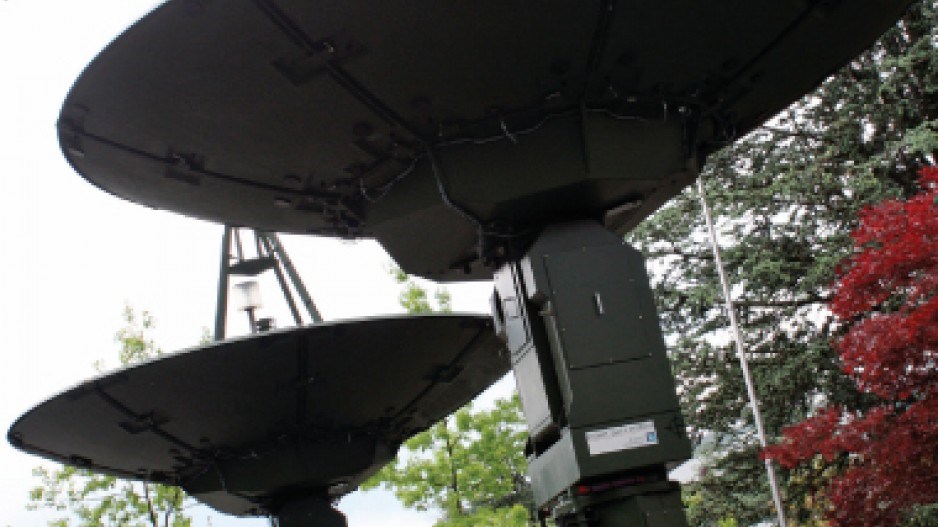MacDonald, Dettwiler and Associates Ltd. (TSX:MDA) recently finished building two mobile satellite ground stations that will allow Canadian armed forces to get detailed satellite imagery for combat and peacekeeping missions, as well as natural disasters.
But don't let the word "mobile" fool you – it will take a CC-130 Hercules transport plane to deliver them to the Department of National Defence.
At a recent press conference at its Richmond HQ, MDA took the wraps off the two new mobile satellite stations – called Unclassified Remote-Sensing Surveillance Awareness (URSA) systems – built under the $30 million Joint Space Support Project (JSSP).
MDA also won a $10.8 million, five-year operating contract, with options for renewal for up to three more years for $6.3 million.
It's just the latest sign that MDA – which resorted to layoffs last year – is on a major rebound.
Each URSA system includes a large satellite receiving dish, diesel generator and mobile command centre housing servers and computers. The shelters were built by Burnaby-based Weatherhaven.
The systems can be flown to disaster areas, combat zones or peacekeeping regions on transport planes. They can access eight commercial satellites to provide unclassified satellite images, which can then be downloaded onto DVDs or USB sticks for use in the field.
"All of the software development work was done in Richmond as well as the integration of the equipment," said Doug Rae, MDA's vice-president of business development, surveillance and intelligence. "There were several dozen jobs as a result of that."
Military satellite data is classified, so it can't be easily shared.
"Because these are commercial satellites, they're unclassified," Rae said. "So one of the benefits to this system is it's very easy, if you are in coalition operations, to be able to share the data with coalition partners, which you might not be able to do with some classified data."
The scale of the JSSP is small compared with the Canadian Space Agency's RADARSAT Constellation Mission. MDA is the prime contractor on the program.
Three new satellites will built and, after they are launched, will provide Canada with land and ocean surveillance for marine navigation, environmental monitoring and natural disaster management.
The program appeared to be in jeopardy last year, when the federal budget did not include funding for it, prompting MDA to start implementing layoffs. The funding was eventually approved and MDA was awarded a $709 million contract in January.
"We're fully under contract and going ahead building the satellites," Rae said, adding that the project will provide hundreds of jobs over several years.
Meanwhile, in what some analysts saw as a move aimed at reducing its reliance on Canadian defence and space agency contracts, MDA bought Space Systems-Loral (SSL), a California satellite manufacturer, for US$875 million in November 2012.
The acquisition of the similar-sized company has doubled MDA's size and value. Combined, the companies have 4,500 employees in Canada and the U.S. and a market cap of well over $2 billion.
The acquisition has boosted both MDA's revenues and its stock, not to mention its future business prospects in the U.S., said Thanos Moschopoulos, Canadian technology equity analyst for BMO Capital Markets.
"It really helps make MDA a world leader in the satellite market," Moschopoulos. "Previously, with their antenna and payload business in Montreal, they were a key supplier to the satellite market, but they weren't really a prime contractor. Now, with SSL, they are the largest manufacturer globally of communication satellites."
MDA finished the first quarter with a record backlog of orders worth $3 billion and posted a revenue of $428 million – up from $172 million for 2012's first quarter.
That increase in business has boosted MDA's stock prices to a record high of $73.17 in March – an 83% increase over last year's low of $39.94 in 2012.




